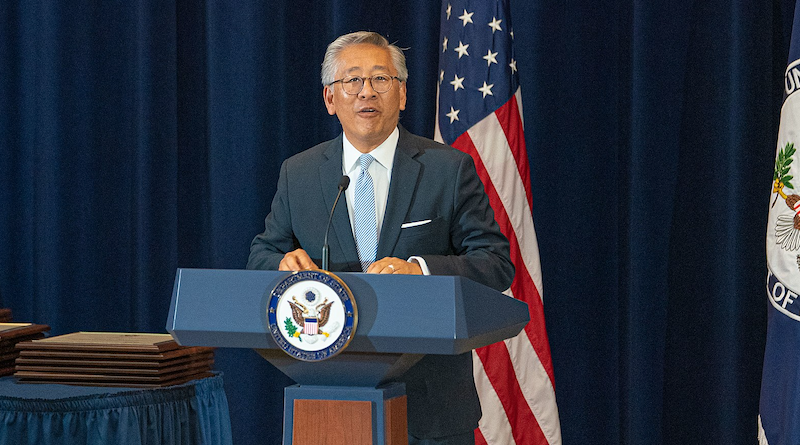Welcoming Lu In Bangladesh: A Chance To Revisit The ‘American’ Way? – OpEd
By Aziz Patwary
A nation never forgets its insults. Perhaps this is the reason that after 51 years of independence of Bangladesh, the national political commentators and analysts frequently stretch down Secretary of State Kissinger’s overhyped comparison of Bangladesh to the ‘bottomless basket’ in 1971 which Kissinger never said. Probably the overshadowing of the original fact has resulted in an all-and-out cynicism among the Bangladeshi civil society long endured even after the persisting upward trend of deep diplomatic engagement that developed between Bangladesh and the US since 1972. This ‘hesitation’ is also observable with regard to the US Assistant Secretary Donald Lu’s upcoming visit to Bangladesh on 15th January given his ‘debatable’ role in South Asian politics and the uneasiness between the two countries silted up in recent times.
However, the political landscape and the global economic relations have changed a lot in the half-century period. The tie of the two countries has also extended their bilateral economic and political cooperation to a greater level. The two countries have made 17 mid-level state visits in the last two years of which the US has made 10 visits to Bangladesh. Sharing a complex economic interdependence, the Bangladesh-US bilateral trade has only seen an upward trend by reaching USD 22 billion in 2022, far greater than previous years. Such burgeoning trade has made the US the 3rd largest trading partner for Bangladesh. The US takes pride in their share in Bangladesh’s development success story, investing over USD 8 billion dollars in development cooperation, making it the top aid provider to Bangladesh among all Asian countries. Among other trade areas, US companies hold around 55% stake in the country’s natural domestic gas production including investments in power projects, making it one of the crucial investors in Bangladesh’s energy economy.
Considering Bangladesh’s goal to modernize the military by 2030, the US has also extended their defense cooperation in this regard. Both countries are eager to sign two defense agreements namely General Security of Military Information Agreement (GSOMIA) and the Acquisition Cross-Servicing Agreement (ACSA) to boost up security cooperation. In 2022, the two countries also held Partnership Dialogue and Security Dialogue which paved the way for such agreements. However, the issue of human rights has become a thorny topic between the two countries, notable by the US sanctions on RAB (Rapid Action Battalion) officials. The dissatisfaction over internal political situation is another debatable scenario as Bangladesh considers US concern to be contradicting to Vienna Convention of Diplomatic Relations.
The US Assistant Secretary Donald Lu intends to visit Bangladesh and India to hold a series of meetings this January. Among a range of priority-issues with regard to energy, trade, security, governance cooperation and human rights, Lu’s primary interest would be to facilitate regional cooperation of the Indo-Pacific Strategy of which India has been a willing partner to engage. The Biden administration also showed their willingness to enjoin Bangladesh into IPS as well as other US-led forums such as IPEF.
Appointed in 2021 as the Assistant Secretary of South Asian and Central Asian affairs, Donald Lu has been serving the US Foreign Service for more than 30 years. An Ivy-League graduate, Lu has served as the US Ambassador to Kyrgyzstan and Albania. However, his previous early career from the 1990s started with India and Pakistan where he served in various capacities. Before reaching to the top-ladder of US diplomacy, Donald Lu has been well-acquainted with South Asian politics and economic affairs.
However, Lu’s diplomatic engagement has come into question when Pakistani President Imran Khan accused him for regulating Pakistan’s ‘Lettergate’, a US-backed regime change conspiracy to topple the government. The former president alleged that US diplomat Donald Lu played a key role in influencing the no-confidence motion in the parliament by giving threats of damaging diplomatic relations in future if it happened otherwise. Not only in Pakistan, Lu has been on news in Nepal as well for his warning on hesitation regarding MCC compact ratification by Nepal. Despite having a deep resentment towards MCC grant in Nepalese society, also shared by the Prime Minister Pushpa Kamal Dahal at first, after warning on reviewing Nepalese ties and publicized ‘duplicity’ on the Prime Minister’s part, the MCC compact was ratified through parliament in March 2022. The US also extended his positive support to the newly appointed Sri Lankan president Ranil Wickremesinghe after a severe debt-crisis in 2022, when Lu freshly remarked “You’re the right man” to lead the island. The visit facilitated the US promise to support the debt-restructuring process to resolve the country’s balance of payment crisis.
The region received the engagement of Donald Lu in South Asian political affairs wryly. Particularly, the Pakistan’s Lettergate and Nepal-MCC incident have put Lu in an awkward situation with allegations in influencing internal politics of Pakistan, Nepal and Sri Lanka. It is no surprise that South Asia plays a key role in global politics where small countries like Bangladesh, Nepal and Sri Lanka have significant roles in maintaining regional security and stability. Countries like Russia and China are increasingly dissatisfied with the way the US is engaging these small countries.
Therefore, this visit will be significant for the US part to revisit and mollify such heuristic judgements in political engagements in South Asia. Perhaps the assistant secretary Lu can show his way to a more cooperative and less altering intention to engage with Bangladesh in his visit. This is also a chance to elevate the US-Bangladesh partnership through the two country’s mutual understanding, concerted efforts and support for upcoming golden years.
Aziz Patwary is a British-Bangladeshi and former World Bank Employee

